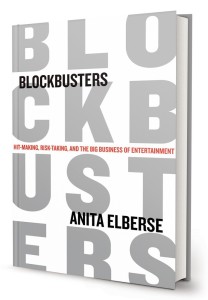If you want to make money as an artist, or at least understand what’s happening to writers, musicians, and other entertainers in the age of Amazon, iTunes, and Netflix, you really need to read Anita Elberse’s book, Blockbusters. A professor at Harvard, her conclusions are grounded in plenty of evidence and ten years of research. I can’t stress enough how much this book has changed how I look at the publishing industry. At the very least, you should watch her twenty-minute interview with Charlie Rose, where she hits most of the high points of her book.
I had originally planned to write a much longer post about what I learned, particularly the middle chapters about the digital disruption, but it’s not much different than what I wrote a year ago with a few exceptions. You should read this book if . . .
- You want to know why Chris Anderson was wrong about “the long tail,” and that there is even more concentration toward bestsellers than the pre-Internet days (and increasingly so)
- In most digital marketplaces 85% of the income is made by 1% of the products, 95% by 5% of the products, and that the bottom 75% make virtually nothing
- That publishers, studios, and music companies are absolutely correct to bet big on blockbusters
- And why simply putting out a lot of products, at least by itself, is not a winning strategy for any artist
She does not lay out that strategy. That’s not her target audience. If you’re a writer, musician, filmmaker, or any kind of artist working in the digital age, that’s up for you to decide. I’ll just say this: It’s not getting any easier. If you want to make more than pizza money, you need to take the long view, constantly striving to get better at both the craft and the business, and do what you can to give your work maximum visibility.
I’ve recommended this book to a number of writers already, and when I told them about some of the conclusions, they’ve all said it sounded pretty depressing. I don’t think it has to be. Yes, the bad news is that it’s probably just as hard, if not harder, to make money as an artist as it was before there were so many ways to go direct to an audience. The good news is that the playing field is more open to newcomers than ever before. There are no gatekeepers except the fans themselves, and they will give you their attention — the most precious commodity in the modern entertainment era — if you earn it.

